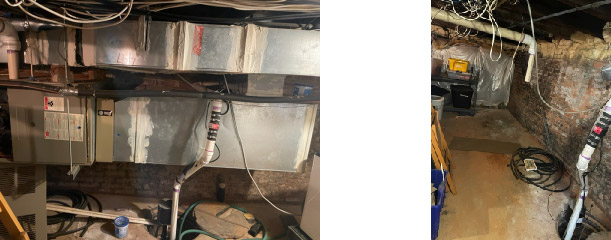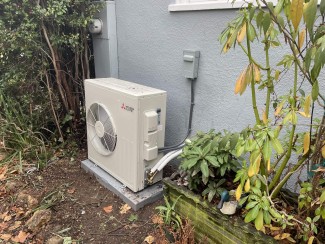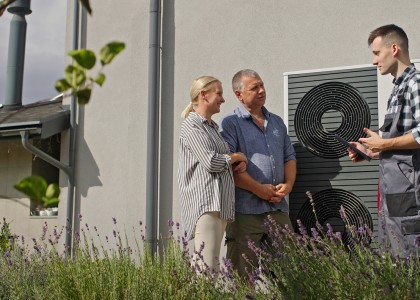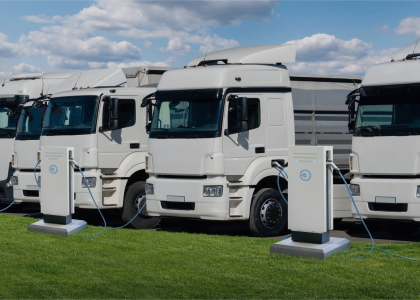If you know ACEEE, you know we champion heat pumps because they are a highly efficient way to heat and cool homes and other buildings. But we don’t just write reports about them; more and more of us are using them in our own homes.
Below, several staff share their personal experiences installing, using, and repairing different types of heat pumps. We are homeowners and renters; we live in apartments, condos, and single-family houses in different climates. But we’re all happy with our heat pumps (and have learned a lot along the way).
Wendy Koch, Senior Director of Marketing and Communications
"Nearly as soon as my husband and I bought a tiny 1922 single-family home last year in Alameda, California, the furnace died. It was October, and winter was coming. As an electric heat pump fan, I knew what we wanted. The hard part was getting it. Thanks to supply chain problems, the inventory for heat pumps was very low, so companies kept trying to sell us gas furnaces.
I insisted on bids for heat pumps. In our case, mini-splits would have cost several thousand dollars more than a ducted system and required wall repair. Because the house already had vents, we opted for a ducted air-source system, which can be slightly less energy efficient but allows for a whole-house air filtration system. We couldn't find an ENERGY STAR®-certified unit, unfortunately, and settled for a fairly efficient one. Like us, many homeowners don’t replace their HVAC until it dies, often leaving them too little time to find the best model and price.
One big plus of the system: the house didn’t have air-conditioning before, but now it does."
Aimee Bell-Pasht, Federal Policy Senior Research Analyst
"I rent a two-bedroom apartment in New York City, on the top floor of a brownstone. We have a ductless mini-split system with two indoor units (a smaller one in the bedroom and a larger one in the living room). We also have natural gas heating.
We moved in in May, and as summer progressed, we figured that our heat pump wasn’t very good or wasn’t sized correctly (the apartment was cool-ish on the best of days but not great). Eventually it started to get too hot to work from home and we called the landlord, who luckily was responsive. It turns out that our unit was broken and had been leaking refrigerant!
After two full days of the maintenance workers trying to find what turned out to be a very small leak, they patched everything up and the unit works great. In fact, the apartment is a little too cold and I’m surprised at the temperature settings I end up using—I now set the units to about 74 to 76 degrees econo-cool."
"This type of air-conditioning is really nice compared to using window units! Now our windows are unobstructed, and we don’t have to worry about lugging a window unit in and out of storage (or installing it safely). And the mini-splits are way more effective at cooling the space; it feels like central AC."

Lowell Ungar, Federal Policy Director
"I live in a cohousing condo in Washington, DC. We have a ducted ground-source heat pump and it works well. Fairly tight construction (which limits air leaks) also helps keep steady temperatures.
The heat pump does not need backup even on the coldest days in DC. And the energy bills are nice—my electricity bills top out at less than $60/month in the winter and usually are closer to $35. I would guess I pay less than $100 a year for heating and cooling (however, buying the system was expensive). It also helps that I have a “desuperheater,” which uses waste heat from the heat pump to preheat water for my water heater.
There are a couple challenges to be aware of: Our complex has small HVAC closets, so replacing the heat pumps has occasionally been difficult. More broadly, finding contractors who understand ground-source heat pumps has sometimes been an obstacle. Also, in a few units there were leaks in the underground pipes early on—we generally just abandoned those pipes and doubled up on others."
Mark Kresowik, Senior Director of Policy
"I live in a townhouse in Washington, DC. The home already had a ducted air-source heat pump system when we bought it, but we have since replaced the system. When we did, we learned the duct work was the wrong size for the house and system, probably due to being designed for a gas system that was there before, and one contractor wouldn't replace it. Fortunately, we’ve had no significant issues since the replacement.
We now have no gas bills, and thanks to our solar panels, nearly no energy bill at all. So there’s no air pollution, and we have comfortable temperatures. What more could you want?
My advice to the heat-pump curious is to plan ahead before you need to do an emergency replacement. It can be difficult to find a knowledgeable, available contractor who has equipment ready to go."
Jennifer Amann, Buildings Program Senior Fellow
"I live in an 1860s-era rowhouse in Baltimore that’s roughly 1,800 square feet. We are in the process of replacing our gas furnace, central AC, and associated ductwork—all installed by a previous owner—with a ductless heat pump system.
We’ve had a number of problems with the old system. Plus, I want to electrify and get off gas.
We’ve first made the house as efficient as it can be without replacing the HVAC. We did a whole-home retrofit through Home Performance with ENERGY STAR in 2012 to air seal and beef up insulation. We’ve also replaced all the windows and installed a cool roof.
Rather than continuing to struggle with inadequate ductwork, we decided to move to a ductless system. We can take advantage of the very high system efficiency and have better control over the temperature in different parts of the house depending on who is occupying the space and at what time of day. Plus, removing the ductwork in the cellar has given us back our storage space!
We were able to take advantage of a utility rebate from Baltimore Gas and Electric and low-interest financing from the Maryland Clean Energy Advantage Loan program."

Replacing a ducted HVAC system (left) with a ductless heat pump system allowed Amann to recover storage space (right).
Interested in heat pumps? Don’t get stuck in the cold (or heat): Plan ahead!
A common theme noted by ACEEE staff is the need to advocate for yourself with contractors, who may try to steer you toward a conventional furnace, especially if your HVAC has failed or is failing. Many replacements are done on an emergency basis, and people usually—and understandably—get a like-for-like replacement.
It can take time and research to find contractors who install heat pumps. If you think your HVAC system could fail in the near future, consider identifying qualified heat-pump contractors in your area ahead of time and discussing your heat pump options. When the time comes, you will be ready to upgrade!
The new federal climate law will help make heat pumps more affordable:
Replacing an HVAC system can be prohibitively expensive. The good news is that the recently signed Inflation Reduction Act includes incentives to help low- and moderate-income households afford heat pumps. The following will be available starting January 1, 2023:
- Purchasers of highly efficient heat pumps will qualify for a 30% tax credit up to $2,000 (this also applies for heat pump water heaters). For the remainder of this year only, it’s a $600 credit for ENERGY STAR heat pumps. The credit goes to the homeowner for their principal residence.
- For ground-source heat pumps the credit also covers 30% of cost, but with no cap.
- States will be starting rebate programs for low- and moderate-income households (up to 150% of area median income), which could provide point-of-sale rebates for up to 50% of cost with a cap of $8,000 for ENERGY STAR heat pumps (up to 80% of cost for households under 80% of the area median income).


